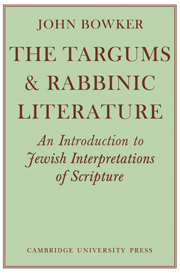PS. JONATHAN ON SELECTED CHAPTERS OF GENESIS
Published online by Cambridge University Press: 01 June 2011
Summary
Explanatory Note
The purpose of the second part of this book is to give substantial illustration of targum-method and material. It consists of a translation of Ps. Jonathan on the following chapters or passages in Genesis: i–ix; x. 8–14; xi. 1–9, 27 f.; xiii. 10–13; xiv. 13–15, 18–20; xv. 1–6; xvi. 1–6; xviii. 1–25; xix. 24; xx. 13; xxi. 1–2, 33; xxii; xxvi. 5; xxxvii; xxxix–1.
The translation of Ps. Jonathan of each chapter or section is followed, for the purpose of comparison, by a translation of selections from other Targums on the same passages. (So far as the Fragmentary Targum is concerned, it should be noted that the Fragmentary Targum does not exist for every verse in Genesis; but wherever a verse, or part of a verse, occurs in Ginsburger's edition, reference has been made to it, even if it has not been translated. In this way, the reader will know whether a particular verse occurs in Ginsburger's edition of the Fragmentary Targum or not. Similarly, a complete index of the passages edited by P. Kahle from the Cairo Geniza will be found in Appendix VII.)
The selections from other Targums are then followed by notes, in which the background of the targum interpretations is explained. These notes consist largely of further translations of rabbinic or other works, and they are thus intended to give even greater illustration of the methods and techniques of Jewish and rabbinic exegesis.
- Type
- Chapter
- Information
- The Targums and Rabbinic LiteratureAn Introduction to Jewish Interpretations of Scripture, pp. 93 - 94Publisher: Cambridge University PressPrint publication year: 1969



